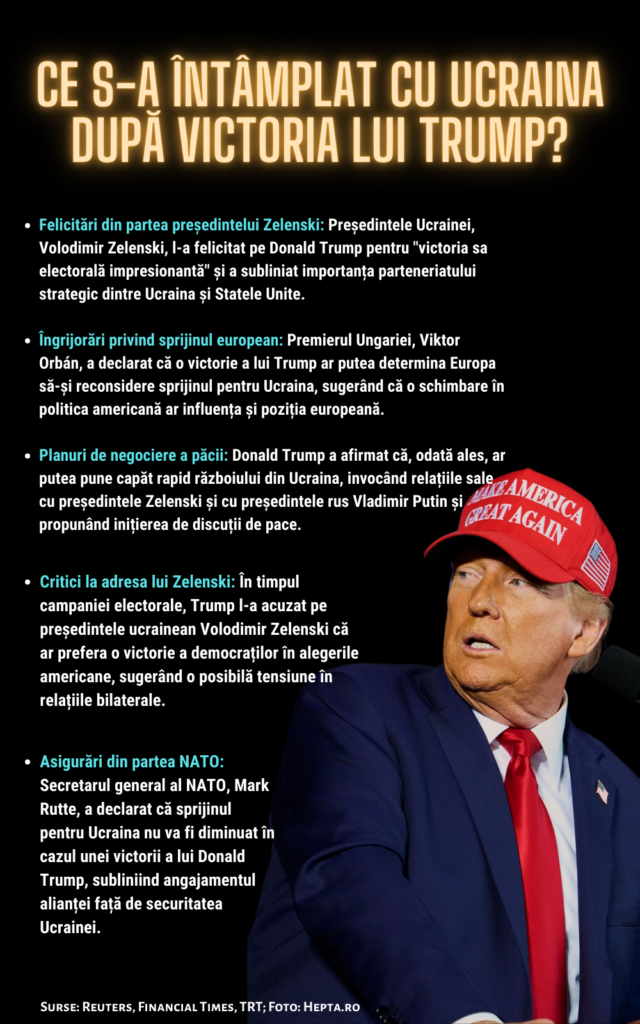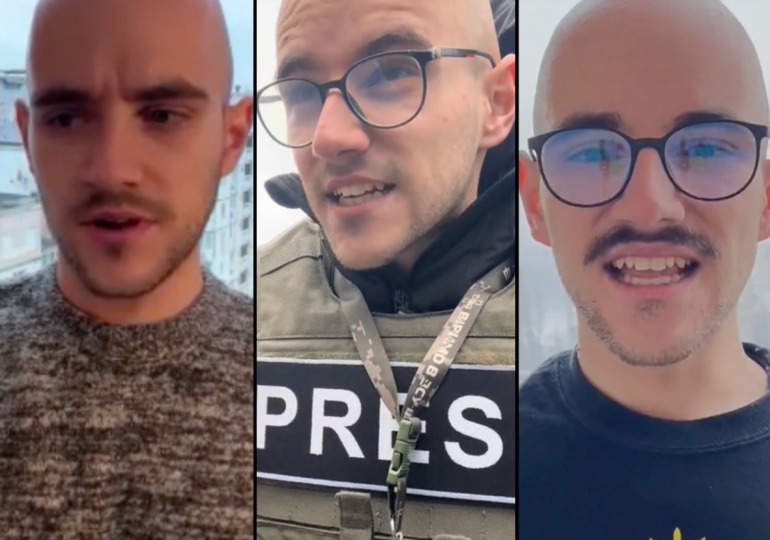Alex Craiu has established himself as an unconventional war correspondent, capturing the public’s attention with authentic reports published on social networks. With studies in cinematography and a passion for documentaries, Alex initially arrived in Ukraine as a „war tourist,” curious and eager to understand and experience the reality of the conflict.
The initial curiosity quickly turned into a personal mission, that of bringing true images and stories from the conflict-affected areas to the Romanian public, from the perspective of Ukrainian civilians affected by the war.
Hello, Alex! Please tell me, what motivated you to move to Kiev and become a war correspondent?
First of all, I believe there were several factors that led me to make this decision. It wasn’t a specific moment, but rather a series of circumstances and a deep curiosity about the reality of war.
I first came to Ukraine out of pure curiosity in 2022. At that time, I could say I was a kind of „war tourist,” as it happens, unfortunately, with more and more people attracted to armed conflicts.
Fortunately, I didn't come just for thrills, but to understand and feel firsthand the atmosphere of the conflict. My desire was not to "discover the truth," as I did not challenge the information already available about the war. Instead, I wanted to see what it's like to live in the midst of such a critical situation.
I came here in 2022 out of curiosity... not to discover the truth, but to see how this war feels.
Alex Craiu, war correspondent
In 2022, when I arrived in Ukraine, I started traveling to different regions of the country, exploring places along the front line and understanding the dynamics of life in the war-affected areas.
However, at that time, the situation was still chaotic, no one knew exactly how to ensure the safety of civilians or regulate access to certain high-risk areas. Now things have changed considerably: there are strict protocols and clear rules.
When exactly did you arrive in Kiev?
I arrived in September 2022, nearly half a year after the war began. However, at that time, the atmosphere was different. There were not the same restrictions as today, people could move much more freely, even in conflict-affected areas, and some places were more accessible than they are now.
For example, a civilian could reach almost anywhere. Now, even with journalist accreditation, access to certain places is restricted. At the beginning of the war, no one knew that this conflict would last so long and become so intense.
Recently, there were elections in the United States, and Donald Trump returned to the White House. During the electoral campaign, Trump stated that the war in Ukraine would end within 24 hours of his return to the White House. How did Ukrainians perceive this outcome? How do they see the future in the new context?
I noticed that Ukrainians were more afraid of the election outcome before it became official. Their fear of a possible success for Donald Trump seemed greater before he was declared the winner than it is now, when his return to power is a reality.
This reaction is also due to how Ukrainians perceive politicians on the international stage. Here in Ukraine, right-wing extremist leaders from various countries – such as Viktor Orbán, British leaders like Nigel Farage, and obviously, Vladimir Putin – are viewed with skepticism. And the fact that Trump has returned to the White House worries many, as he was not a strong supporter of Ukraine in the past.
In Ukraine, international right-wing extremists are not well-received... the idea that Donald Trump could win these elections put Ukrainians in a worrying position.
Alex Craiu, war correspondent
However, these days I have been in Maidan Square and talked to ordinary people about how they feel. They are worried, but there is also a glimmer of hope.
It's a psychological reaction: when you fear something and that something actually happens, you start to think that things might not be as bad after all.
Many of those I spoke with now hope that, although Trump is in office, he will not make decisions that are entirely detrimental to Ukraine.
VIDEO. A TikTok post by Alex Craiu with over 70,000 views, 2,700 reactions, and 46 comments about the difficulties of traveling in Ukraine due to the war - Source: Alex Craiu/ TikTok
Putin recently made a statement indicating willingness to negotiate with the United States. Do you think Ukrainians would accept an agreement with Russia, even if it involves ceding territories?
From the discussions and interviews I conducted in Ukraine, I have not met anyone who believes that territories should be ceded. It is almost a national consensus that these territories belong to Ukraine and that it makes no sense to cede them. People have told me that too many Ukrainians have lost their lives defending these lands, and the losses would not be justified if those territories were to be ceded now.
No Ukrainian I spoke to has said that we should cede territories. Too many people have lost their lives to defend these places.
Alex Craiu, war correspondent
Moreover, it's also about the people living in those territories. These are people who could not be evacuated or who refused to leave. Let's take an example: the cities of Pokrovsk and Mîrnohrad, where I was in May-June 2024. Back then, you could still visit these cities, but now the Russians are very close.
If Ukraine were to cede these territories, many Ukrainians would remain in an unsafe area, risking waking up one morning to find their city devastated by fighting. For Ukrainians, these territories are not just plots of land, but places full of people, full of life, and that is why negotiations with Russia over territories are ruled out in the collective consciousness of the people.
However, in Europe and the USA, leaders seem to be increasingly open to the idea of a compromise. Do you think the population is rallying around Zelensky, or is he now being criticized for how the war is unfolding?
I have not seen protests against Zelensky. The existing criticisms are not related to his policy of resistance against Russia, but rather to logistical and moral issues of the war, such as the lack of days off for soldiers.
There are many soldiers who have been on the front line for almost two years, and that is a real problem. Ukrainians feel that those people need support and a certain rotation to prevent complete exhaustion.
Zelensky is seen as a hero, but not in an idealized way. The average Ukrainian is pragmatic and realistic, understanding that, although he has made mistakes, Zelensky is the right man for the current situation.
In Ukraine, there is no tendency to idolize him, but rather a rational support based on the fact that he has managed the crisis correctly and efficiently.

Returning to the war, what is the morale of the troops and ordinary people? How long do you think they can withstand in the new conditions where US military aid may diminish?
The people and troops in Ukraine show amazing resilience. If we look at just the past nights, the bombings and air alarms are constant.
People are forced to sleep with earplugs or ignore the danger because it's not possible to hide in shelters night after night, for hours on end.
In Kiev, for example, people have adapted. Even when there are air alarms, many restaurants and public places do not close immediately unless the danger is very high.
People have adapted to a life between air alarms and bombings... and their courage is a silent protest against this situation.
Alex Craiu, war correspondent
There is a psychological resilience and a lifestyle that has adapted to this context. People somehow live in the proximity of danger, especially in cities in the east and south of the country, but they try to live as normally as possible. I have noticed that in places closest to the front line, such as Sumî or Zaporijie, people do not always go into shelters because air alarms sometimes last seven to eight hours.
They receive warnings on Telegram groups, and if the drone or rocket is heading their way, they decide to take shelter. Otherwise, they continue to live their lives.
What is the economic situation in Kiev? Do people find food in stores, have jobs? How is the atmosphere in Ukraine?
The economy in Ukraine has been affected, but stores in Kiev are well stocked. Prices have increased significantly, and although they are lower than in Romania, relative to Ukrainian incomes, they are quite high.
For example, an average salary here is between 1,500 and 2,500 lei, and rents in Kiev can reach 250-300 euros for a studio apartment, similar to rents in Bucharest.
In areas near the front line, the situation is different. Supplies are difficult, especially in the "red" areas where the fighting is intense and the risks for invaders are very high. For example, in the southern Herson region, it is almost impossible to deliver food without exposing yourself to danger. Thus, access to food and basic goods is a real issue there.
What personally drove you to become a war correspondent and how do you view this experience?
I have always been passionate about documentation and unfiltered reality. I graduated in film studies, but I wanted to focus on documentaries, not fiction.
I felt more like the person behind the camera asking questions, not necessarily a journalist. Initially, I came to Ukraine as a volunteer, but I realized I could help more by showing the reality to people back home.
On TikTok, I can tell the story directly, without formalities… This resonates better because people feel authenticity, the absence of an official media filter.
Alex Craiu, war correspondent
When I started posting on TikTok, people's reaction was incredible. I gained tens of thousands of followers and millions of views. I was amazed by this interest and it made me understand that what I do really matters. Many followers told me they want to learn more about the war directly from the field, from an authentic perspective.
I've seen on TikTok that sometimes you use methods similar to promoting products, such as when you presented a bulletproof vest. It's a unique approach. Does such an approach help the audience better understand what war means?
Yes, I believe that this way people manage to relate more easily to what I present.
Many ask me to tell them about life here, about wearing a bulletproof vest. When I do that, I try to speak naturally, as if I were talking to a friend.
I think the online environment requires authenticity. When I tell you directly, without the filter of an official media format, people feel the message is more sincere.
Finally, Alex, how do you see the future of Ukraine in the medium term?
It's a question that comes up often and to which I haven't found a clear answer yet. Ukraine has two possibilities. One of them, which I consider the most likely, is a "frozen conflict" where the territories occupied by Russia would remain under Kremlin control, similar to Crimea and Transnistria. This would create ongoing instability but prevent a direct escalation.
The other scenario, desired by Ukrainians, is complete Russian withdrawal. However, this possibility seems unlikely without significant international pressure.
From the discussions I've had here, Ukrainians don't want the destruction of Russia, they just want to be left alone. They want lasting peace without territorial compromises. It remains to be seen if this will be possible.

